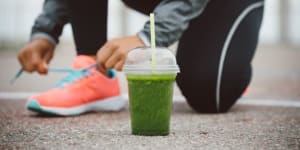
When it comes to training, recovery is one of the most important and often overlooked factors. A good recovery helps a person achieve better results, makes them feel better, and is crucial for your body to heal. One part of a person’s recovery process takes place in the immediate aftermath of a workout. Knowing what to eat post-workout will not only aid in recovery but will also help in increasing performance.
Timing- One question many people have when it comes to post-workout meals is, when should I eat for the most benefit? Most, people think the sooner the better. This is true to a certain extent; you do not want to wait four hours before you consume your next meal. But if you are unable to get anything in your system immediately do not worry. Typically, you should aim to get your post-workout meal in 30 minutes to 2 hours after your workout, with 45 minutes being the ideal period after you finish training for muscle glycogen synthesis.
Carbohydrates-When you exercise your body will use primarily glucose to fuel itself during the workout. Since glucose is being expended in your body you will want to replenish glycogen stores post-workout. Typically, when you finish a workout, you want to aim to get .75 g/kg - 1.5g/kg of your body weight in carbohydrates. If you are doing endurance events you should aim to the top of this number, if you are doing more strength-based training aim towards the middle to lower number.
Examples for a post-workout Carbohydrate meal would be, sweet potatoes, quinoa, chocolate milk, oatmeal, and potatoes
Protein- Most people think after a workout you should consume a ton of protein. More protein=more gains, right? Your body has a maximum limit to the amount of protein it can absorb, if you ingest too much protein at once it will be filtered through the kidneys and lost through urine. Experts recommend getting 15-25 grams of protein post-workout for the average person. Try to get your protein intake in with your carbohydrate intake as carbohydrates stimulate the release of insulin which will stimulate amino acids synthesis in the muscle.
Examples for post-workout protein- protein drink or bar, eggs, greek yogurt, chicken.
Fat- Fats are important for your body as they play a predominant role in your energy stores. When it comes to post-workout, you want to have little to no fats in your meal. The reason being is consuming fats will interfere with the digestion and absorption of carbohydrates and proteins which are vital for a good recovery.
Hydration- The most important nutrient to the human body is water and unfortunately this is a nutrient that most often gets overlooked. During a workout hydration is critical, and when a person is working out it can be difficult to replenish. The most common way a person loses water in a workout is through sweating it out, it is not uncommon for a person to lose 2-7% of their body weight due to sweat. Hydration is very individualized, and everyone will require a different amount of water or carbohydrate/sports drink. For general recommendations, you should aim to drink 2-3 cups of water per pound of bodyweight lost. If you do not know how much bodyweight you lost assume you lost between 2-7 percent of your body weight. If your workout wasn’t too extreme aim for the lower end of that and if it was a hard workout aim towards the top of that. If you worked out between 2-3 hours consider using a sports drink like Gatorade as it will help restore your sodium and potassium stores.
If you have any other questions about workout nutrition or general nutrition, please contact us at Genesis Personal Fitness.

